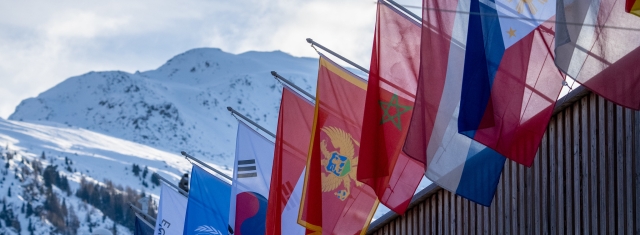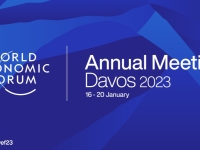News
WHY IT'S TIME FOR THE DAWN OF STAKEHOLDER GEOPOLITICS
World Economic Forum DAVOS 2023

Stakeholder geopolitics addressing critical issues (Source: WEF | Greg Beadl)
ARAC International StratCom -
> Article type: ANALYSIS
> This article was originally published by Foreign Affairs.
> https://www.foreignaffairs.com/world/dawn-stakeholder-geopolitics
This article is part of:World Economic Forum Annual Meeting
* Conflict and competition has created fragmentation around the world.
* In this shifting world, leaders must adapt to a new kind of geopolitics.
* Stakeholder geopolitics offers a way to address critical global challenges.
> This article was originally published by Foreign Affairs.
> https://www.foreignaffairs.com/world/dawn-stakeholder-geopolitics
This article is part of:World Economic Forum Annual Meeting
* Conflict and competition has created fragmentation around the world.
* In this shifting world, leaders must adapt to a new kind of geopolitics.
* Stakeholder geopolitics offers a way to address critical global challenges.
Over the last few years, the world has experienced a gradual slide from cooperation to competition to conflict. The post–Cold War international order has been replaced, first by a period of intensifying global rivalry and then by war in Europe. In this new and unsettled era, world leaders must adapt their understanding and practice of geopolitics because time is running out to address critical global challenges.
In a year that began with conflict and warning signs of geoeconomic fragmentation, it was remarkable that November 2022 delivered a restoration of US-Chinese climate dialogue, a reaffirmation by the G20 of the need for economic cooperation, and an agreement at the UN Climate Conference in Egypt that provided historic “loss and damage” climate adaptation funding for vulnerable countries.
In a year that began with conflict and warning signs of geoeconomic fragmentation, it was remarkable that November 2022 delivered a restoration of US-Chinese climate dialogue, a reaffirmation by the G20 of the need for economic cooperation, and an agreement at the UN Climate Conference in Egypt that provided historic “loss and damage” climate adaptation funding for vulnerable countries.
But such welcome news should not be taken as a sign that a retreat from geopolitical rivalry is underway or that a cooperative order can be fully restored. World powers still hold starkly different visions of what should guide global politics and are vying to shape the new world order accordingly. For this reason, current efforts at cooperation could prove fleeting, giving way to new rounds of conflict. In such a turbulent geopolitical climate, the question becomes: what can a framework for durable cooperation look like?
This question has gained even greater urgency against the backdrop of an ongoing pandemic, a potential global recession, heightened nuclear proliferation risks, and a “now or never” moment for addressing climate change. These challenges are cascading and creating what some analysts refer to as a global “polycrisis” – a situation in which multiple crises compound one another. Because the drivers of these crises are not confined to any one nation, addressing them requires leaders to come together to forge solutions despite the reality of broader geopolitical disagreement.
This question has gained even greater urgency against the backdrop of an ongoing pandemic, a potential global recession, heightened nuclear proliferation risks, and a “now or never” moment for addressing climate change. These challenges are cascading and creating what some analysts refer to as a global “polycrisis” – a situation in which multiple crises compound one another. Because the drivers of these crises are not confined to any one nation, addressing them requires leaders to come together to forge solutions despite the reality of broader geopolitical disagreement.
Simply put, leaders need to manage geopolitical competition in a way that preserves space to align with diverse parties on shared interests. The alternative, competing to define the era ahead but failing to untangle the knot of common challenges, will leave countries worse off in the long run.
Balancing competition and cooperation is a tall order. But there are lessons from the private sector, particularly regarding its growing embrace of stakeholder capitalism. Over the last decade, as governments were retreating from cooperation, the business community has been moving in the opposite direction—coming together to address common challenges while still competing vigorously in the marketplace.
Additional topics that the article goes on to discuss can be found on the link below:
* Age of Distrust
* A New Kind of Geopolitics
* A Winning Formula
Balancing competition and cooperation is a tall order. But there are lessons from the private sector, particularly regarding its growing embrace of stakeholder capitalism. Over the last decade, as governments were retreating from cooperation, the business community has been moving in the opposite direction—coming together to address common challenges while still competing vigorously in the marketplace.
Additional topics that the article goes on to discuss can be found on the link below:
* Age of Distrust
* A New Kind of Geopolitics
* A Winning Formula
License and Republishing
World Economic Forum articles may be republished in accordance with the Creative Commons Attribution-NonCommercial-NoDerivatives 4.0 International Public License, and in accordance with our Terms of Use.
The views expressed in this article are those of the author alone and not the World Economic Forum.
========================================
Disclosure: ARAC International is a member of WEF
Full article can be read at the link provided below.
========================================
____________________________________________________________
ARAC International, Strategic Communications & Analysis
Global Security Analyst | Human Rights Consultant
Certified by the U.S. Institute for Diplomacy and Human Rights
Institute for Economics and Peace Ambassador
https:/iep.arac-international.org
World Economic Forum articles may be republished in accordance with the Creative Commons Attribution-NonCommercial-NoDerivatives 4.0 International Public License, and in accordance with our Terms of Use.
The views expressed in this article are those of the author alone and not the World Economic Forum.
========================================
Disclosure: ARAC International is a member of WEF
Full article can be read at the link provided below.
========================================
____________________________________________________________
ARAC International, Strategic Communications & Analysis
Global Security Analyst | Human Rights Consultant
Certified by the U.S. Institute for Diplomacy and Human Rights
Institute for Economics and Peace Ambassador
https:/iep.arac-international.org
more information: https://www.arac-international.org/2023/01/why-its-time-for-dawn-of-stakeholder.html
Liability for this article lies with the author, who also holds the copyright. Editorial content from USPA may be quoted on other websites as long as the quote comprises no more than 5% of the entire text, is marked as such and the source is named (via hyperlink).






